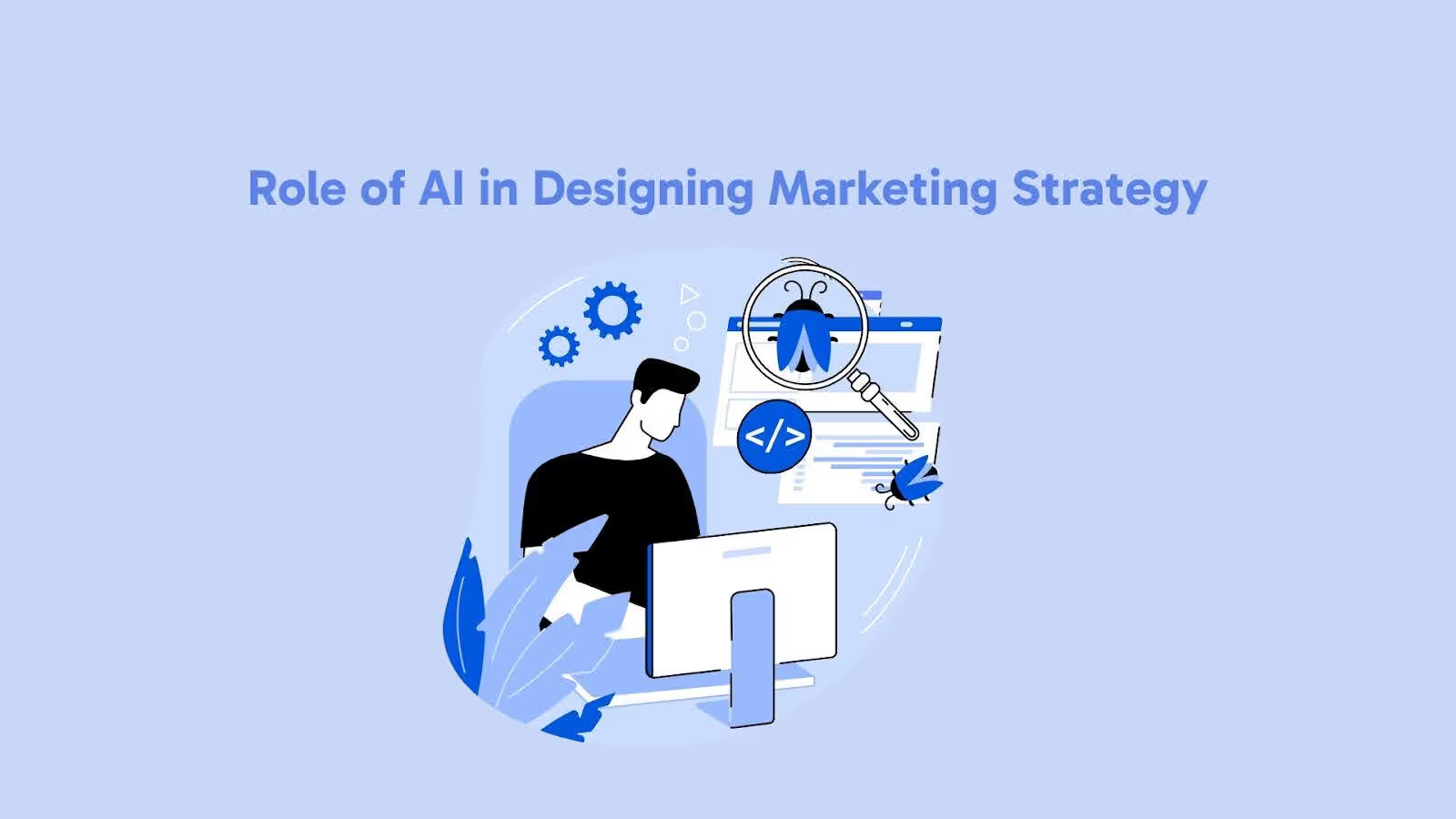Customers expect quick responses, personalized interactions, and solutions before they even realize they need them. Meeting these expectations at scale is a challenge, even for the most experienced marketing and sales teams. AI is helping businesses bridge that gap.
In 2024, 69.1% of marketers reported using AI in their strategies, an increase from 61.4% the previous year. Many businesses are no longer viewing AI as an optional tool but as an essential part of marketing and sales service. The goal is not to replace human expertise but to sharpen strategies, automate repetitive tasks, and uncover opportunities that often go unnoticed.
Traditional data analytics can provide insights, but AI goes beyond that. It predicts customer behavior, adjusts campaigns in real time, and delivers highly personalized recommendations without manual effort. Some businesses are using AI in marketing sales and service to stay ahead, while others are struggling to keep up.
Let’s see how AI in marketing sales and service is helping build strong customer connections.
What is the Role of AI in Marketing Sales and Service
We all know AI is changing business, but the real story is how it's blurring the lines between marketing, sales, and service.
It's not just about automating tasks anymore. AI is creating a unified customer experience where these three functions work together smoothly, powered by data and insights.
What many still haven't understood is the potential for AI to predict customer needs before they even arise, creating proactive and personalized interactions that drive loyalty. Let's explore how AI is improving these core areas.
AI in Marketing Strategy
The phrase “AI is the future of marketing” gets thrown around a lot, but the real impact runs much deeper. Robots are not taking over marketing teams, AI is strengthening them with powerful insights that drive smarter decision-making.
The most successful marketers are the ones who turn complex AI-driven analysis into strategies that connect with customers on a personal level.
Human creativity and AI precision work best together, creating campaigns that are both data-driven and deeply engaging. Let’s explore how AI is shaping modern marketing strategies.
- Customer Segmentation
AI algorithms analyze vast datasets to identify distinct customer segments based on demographics, behavior, purchase history, and preferences, enabling highly targeted campaigns.
AI marketing analytics can help segment customers based on their attrition likelihood and marketing campaigns can be customized accordingly.
- Predictive Analytics
By analyzing historical data, AI can predict future trends and customer behaviors, enabling marketers to anticipate market shifts and demands.
AI can use customer data to anticipate their needs and behaviors so you can target them with more relevant and effective marketing campaigns.
- Personalized Content Creation
AI facilitates personalized marketing by providing data for content recommendations. Marketers can offer recommendations and personalized content by analyzing user preferences and behavior, which increases engagement and drives conversions.
- Campaign Performance Analysis
AI evaluates the effectiveness of marketing campaigns in real-time, providing insights into what’s working and what isn't.
By leveraging AI marketing analytics, you can monitor how customers engage with your campaigns at different stages of their purchase journeys and content can be customized to guide them effectively.
- Informed Choices
AI-driven analytics tools ensure that marketing strategies are grounded in solid data, reducing the reliance on guesswork and intuition. Marketing strategies become more effective and targeted as a result.
AI in Sales Optimization
AI has improved the way sales teams work, moving from static CRM data to real-time, predictive insights. Early on, AI played a role in automating tasks and analyzing data, but recent developments have taken it further.
Tools like conversation intelligence and revenue intelligence now help sales teams make informed decisions and create stronger customer connections.
While many focus on AI’s common uses in sales, there are many more ways AI is driving significant changes. Let’s take a closer look at some of them.
- Personalized Customer Interactions
AI analyzes customer data to provide personalized recommendations and messaging, increasing customer engagement and satisfaction.
For example, AI-powered chatbots can engage with prospects in real time, providing responses based on their browsing history and previous interactions.
- Improved Sales Forecasting
With predictive capabilities, sales teams can accurately forecast sales trends and understand seasonal demand. Using AI tools allows businesses to analyze historical data and market trends to generate sales predictions.
- Optimized Pricing
By analyzing data, AI sales assistant tools can suggest pricing strategies to maximize profit. Some sales AI tools determine pricing for a customer using information gathered from past purchases and applying it to an algorithm.
- Lead Scoring and Prioritization
AI systems score leads based on factors such as demographic information, online behavior, and engagement with marketing materials. This scoring allows sales teams to concentrate on leads with the highest probability of conversion, optimizing their time and resources.
- Sales Process Automation
AI can automate stages in the sales process and deliver content to prospects to shorten the sales cycle and close deals faster. AI-driven CRM systems can automatically update records, manage communications, and prioritize leads based on their conversion likelihood.
- AI-Enhanced Closing Techniques
These techniques use AI and machine learning algorithms to analyze, predict, and optimize the closing stage of the sales process. AI analyzes past successful closes to identify optimal timing and phrasing for assumptive closes based on prospect characteristics and behavior patterns.
The chatbot market is forecasted to be valued at $1.25 billion by 2025, with 90% of marketers using AI tools for customer interaction automation.
Now that we've explored how AI optimizes sales let's examine how it improves customer service and builds stronger client relationships.
AI in Customer Service Excellence
AI in customer service has moved far beyond basic chatbots. With technologies like multimodal interaction analysis and cognitive architectures, AI can now interpret customer behavior, recognize emotional cues, and adjust responses in real time.
Sentiment analysis, for example, helps detect early signs of dissatisfaction, giving businesses the chance to step in before issues escalate. These advancements are shaping customer interactions in ways that go beyond automation, making service more responsive and personalized.
Let’s look at some of the most impactful ways AI is changing customer service today.
- AI Agents and Chatbots
Next-gen AI agents use conversational AI to resolve customer issues from beginning to end. They're pre-trained on real interactions, enabling them to understand complex questions and provide accurate resolutions.
AI-powered self-service tools handle basic inquiries agentless, reducing strain on human agents while maintaining high levels of customer satisfaction.
- Personalized Recommendations
AI analyzes customer data to offer recommendations and personalized content. By analyzing user preferences and behavior, it increases engagement and drives conversions.
- Proactive Service
AI can predict customer needs and potential issues before they arise, enabling businesses to address them proactively. By drawing information from contracts, warranties, purchase histories, and marketing data, AI can suggest the next best actions for agents to take.
- Improved Agent Assistance
AI guides live agents with insights and suggested actions, leading to faster resolution times. Generative AI can summarize customer conversations and create knowledge base articles for future use.
- Streamlined Operations
AI suggests which service inquiries are best suited for automation and optimizes workflows, enabling support teams to streamline their operations. Digital twins can simulate how your service operation runs in real time, providing a risk-free environment to test changes and optimize processes.
With improvements of AI in marketing sales and service, it's essential to acknowledge the challenges of adopting these powerful tools.
Critical Challenges of Implementing AI in Marketing and Sales
Bringing AI into marketing and sales comes with challenges that go beyond data privacy concerns and system compatibility. Ethical AI practices, the limitations of AI-generated content, and the growing skills gap in AI literacy are all pressing issues.
Businesses often struggle to balance automation with human creativity while ensuring AI-driven decisions remain fair and transparent. Let’s take a closer look at some of the hurdles companies face when adopting AI in marketing and sales.
- Data Privacy Concerns: AI relies heavily on customer data, raising concerns about privacy and protection. Companies need to ensure that they comply with data protection regulations like GDPR.
- Bias in AI Models: If AI models are trained on biased data, they can produce biased outcomes, which may negatively impact marketing and sales strategies. Companies must prioritize fairness and transparency.
- Implementation Costs: Developing and integrating AI systems can be expensive, especially for small businesses. The high initial investment in AI technology can be a barrier for many companies.
- Training and Adaptation: Successfully implementing AI requires training employees to use the tools effectively and to adjust workflows to integrate AI solutions smoothly.
While there are challenges of AI in marketing sales and service, the potential for AI to modify the future of marketing, sales, and service is undeniable as we explore next.
The Future of AI in Marketing Sales and Service
AI is evolving beyond automation, with predictive analytics and generative AI leading the way. Businesses are moving toward a future where customer interactions feel more intuitive, with AI anticipating needs and providing real-time solutions.
These advancements are changing how companies approach engagement, decision-making, and personalized experiences. Let’s take a closer look at the trends shaping what comes next.
- Advanced Personalization: As AI models evolve, they will deliver hyper-personalized experiences at scale, improving customer satisfaction and engagement.
- AI-Driven Predictive Marketing: Businesses will rely more on AI to predict trends and behaviors, making marketing campaigns more forward-thinking and proactive.
- Voice Search Optimization: As voice search grows, AI will play a crucial role in optimizing marketing content for voice-based searches, helping businesses capture this new consumer behavior.
- Augmented Reality (AR) and AI Integration: In the future, AI and AR will work together to create immersive marketing experiences where customers can interact with products in a virtual environment before purchasing.
Conclusion
AI is transforming how businesses handle marketing, sales, and service, offering smarter insights, automating repetitive tasks, and delivering more personalized customer experiences. While adopting AI in marketing sales and service can come with challenges, the rewards of improved efficiency, better decision-making, and improved customer engagement are well worth it for forward-thinking companies.
Thinking about using AI in your business? Nurix AI can help you discover how our AI-driven solutions can take your marketing, sales, and service to the next level. Get in touch with us!
FAQs About AI in Marketing, Sales and Service
1. How does AI in marketing, sales, and service improve customer segmentation and personalization?
AI in marketing, sales, and service uses advanced algorithms to analyze vast customer data, enabling businesses to create highly personalized marketing campaigns and customize sales approaches to specific customer segments, thereby increasing engagement and conversion rates.
2. What role does AI in marketing, sales, and service play in optimizing sales forecasting and lead scoring?
AI in marketing, sales, and service improves sales forecasting and lead scoring by analyzing historical data and real-time market trends, allowing businesses to predict future sales opportunities more accurately and prioritize high-value leads.
3. How does AI in marketing, sales, and service automate repetitive tasks and improve productivity?
AI in marketing, sales, and service automates tasks such as data analysis, lead generation, and customer service interactions, freeing up resources for strategic activities and improving overall team productivity.
4. Can AI in marketing, sales, and service improve content creation and campaign optimization?
Yes, AI in marketing, sales, and service uses generative AI tools to create personalized content and optimize marketing campaigns in real-time, ensuring that messages resonate with target audiences and drive better engagement.
5. How does AI in marketing, sales, and service help in predicting customer purchase intent?
AI in marketing, sales, and service uses predictive analytics to analyze customer behavior and market trends, enabling businesses to anticipate purchase intent and customize marketing strategies accordingly, leading to more effective sales outreach and higher conversion rates.








